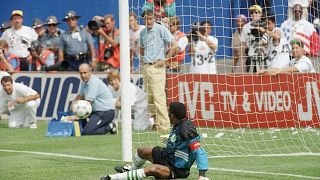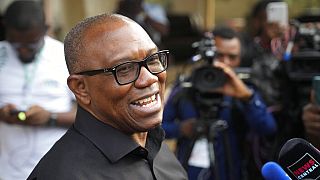Nigeria
Sunday May 29 will be exactly a year since Muhammadu Buhari assumed the reins of power in Africa’s most popular nation, Nigeria.
The country’s citizens however appear divided over the performance of their leader over the past year at the helm of affairs.
Buhari won the election on the back of promises including a fight against corruption and a fight against the Islamist militant group Boko Haram which is on a quest to establish an Islamic caliphate in the northern part of Nigeria.
His battle against Boko Haram appears to have bore some promising fruit as he recently indicated when he hosted a regional security summit attended by French president, Francois Hollande and leaders from other neighbouring countries including Paul Bia of Cameroon and Patrice Talon of Benin.
“When we came in, and Nigerians know, Boko Haram was controlling at least 14 local governments where they hoist a flag and call it a republic, or rather a caliphate of some sort. But now they are not holding any local governments,” Buhari said at the start of the summit.
As if to convince skeptics about this feat, the Nigerian military early this month rescued one of the over 200 missing schoolgirls from Chibok in the Sambisa forest with the help of a local vigilante group.
But this feat might not rate the president so high on the score cards of the average Nigerians like Chima, a trader.
“The government is not trying at all. Make him give us good roads, a better light and water. Make him give us the necessary requirements we have to need” (The government is not doing well at all. It should provide us with good roads, power and water. It should provide us with our basic necessities) he told the AFP news agency.
He’s not the only one with that thought as some Nigerians on social media think choosing Muhammadu Buhari over Goodluck Jonathan was a mistake.
The deadly mistake Nigerians made was not in handing defeat to GEJ. It was in replacing him with a ruthless tyrant. #PMB365Days
— Lucky (@skynet_006) May 28, 2016
So full of deceits, anger, unfulfilled promises, steady depreciation of electricity but hike in tariffs and taxes #PMB365Days
— Kolade Bright (@kola2bright) May 28, 2016
With a 0.36 percent contraction of Gross Domestic Product recorded in the first quarter of this year, analysts have warned that Nigeria is headed for recession.
The figure is said to be lowest growth recorded by the country since its return to democracy in 1999.
Inflation for the month of April also hit a six-year high of 13.7 percent as announced by the Nigerian Bureau of Statistics.
Some have blamed the economic challenges on the delays by Buhari in setting his government in motion. It took him six months to appoint his ministers and another five months to approve his record $30 billion dollar budget for 2016.
Economist, Bismark Rewane however told AFP, the biggest challenge for Buhari’s administration “is to restart the economy by stimulating it” as whatever measures put in place, will take at least a year to have any real effect.
The country’s woes are also tied to the slump in global crude oil prices as oil accounts for about 70 percent of the country’s income.
Whereas the government may not be able to do much on the global front, it will have to gird up its loins to deal with militants who have renewed attacks on oil installations in the oil-rich Niger Delta.
Residents in the Delta area have for long complained about poverty in the oil-producing area. The renewed attacks therefore mean interruption in the production of oil and by extension loss of income.
On Thursday, militants attacked the Batan oil field in Warri prompting the government to move military reinforcements to the area.
A committee set up by leaders in the oil-producing Delta state have warned that a military approach to the problem would not work.
The British Foreign Minister, Philip Hammond has also suggested that president Buhari deals with the root causes of poverty and anger about oil spills.
Nigeria is now producing less than 1.5 million barrels of oil per day, less than the 2.2 million barrels per day earmarked in the 2016 budget.
Buhari who famously said in March 2016 “we cannot build an economy where corruption is the working capital” appears to be staying true to his promise to fight corruption.
#PMB365Days
Within 6mnths EFCC secured +140 convictions, recovered BILLIONS of DOLLARS, blocked laundering avenues pic.twitter.com/nWuaWRVs42— Jack Obinyan-Buhari (@JackObinyan) May 27, 2016
Since his assumption of office, several people including some high ranking people in Goodluck Jonathan’s government have been arrested and are facing or awaiting trail for embezzling public funds.
Nigeria’s third most powerful man, senate president, Bukola Saraki for instance is on trial for allegedly falsely declaring his assests when he served as governor of Kwara state in central Nigeria between 2003 and 2011.
Former National Security Adviser, Sambo Dasuki is also awaiting trial for allegedly mismanaging billions of dollars meant for the war against Boko Haram.
As Buhari crosses the one-year threshold in his administration, Nigerians and indeed the world may have to hold him up to his words that “I cannot change the past. But I can change the present and the future”.













01:06
Brazil launches major security operation ahead of BRICS Summit
11:15
AI drones lead breakthrough against malaria in Africa [Business Africa]
02:18
Netherlands returns 119 artifacts looted from Nigeria
Go to video
Evacuations begin: African citizens caught in Israel-Iran crossfire
02:08
Gunman attack in north-central Nigeria: death toll climbs to 150
Go to video
Protesters gather in Ivory Coast, demand Thiam's return on electoral list